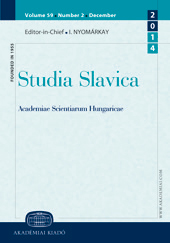Древнейшие славизмы в латышском языке: некоторые проблемы исторической реконструкции
The oldest Slavism in Latvian: some problems of historical reconstruction
Author(s): Igor KoshkinSubject(s): Theoretical Linguistics, Morphology, Semantics, Historical Linguistics, Comparative Linguistics, Baltic Languages
Published by: Akadémiai Kiadó
Keywords: Latvian; Slavic loanwords; relative chronology of loanwords; etymology; historical semantics;
Summary/Abstract: The use of phonetic and semantic criteria in solution of controversial problems of loanword reconstruction is discussed on the example of such words as mētelis ‘coat, cloak’, miers ‘silence; peace; harmony; end; termination of something’, which are traditionally referred to the oldest Slavic loanwords in Latvian. In the language of the East Slavs (Old Russian language), the word ìò2ëü [m’at’el’] as a Germanism was borrowed before the loss of nasals but in Latvian the word mētelis as a Slavic loanword was transferred later, at a time when the loss of nasals had already begun. This is indicated by the nature of phonetic substitution when the stage of sequential phonetic evolution of the East Slavic nasal sound was reflected. The use of a phonetic (accentologic) criterion during the historical reconstruction of Latvian miers as a possible loanword allows us to attribute the borrowing of this word to the same historical period of contacts when the borrowing of Latvian mētelis took place, but also makes us reconsider the status of this lexeme as a loanword and makes us assume Latvian miers and Slavic *mirъ to be a common Balto-Slavic lexeme. The original denotative meaning of Latvian mētelis reflects the specific features of the realia and was associated with the meaning of the corresponding word in the source language. Latvian mētelis initially meant ‘cape’. The meaning ‘peace as the absence of war, concluded on the basis of the contract; peace as a result of the termination of a certain state’ contributed to the development of abstract meanings of Slavic *mirъ as well as Latvian miers ‘peace, harmony’. In the semantics of the Latvian word (‘peace, end, the termination of something’), the initial (authentic) meaning is exhibited.
Journal: Studia Slavica Academiae Scientiarum Hungaricae
- Issue Year: 59/2014
- Issue No: 1
- Page Range: 1-13
- Page Count: 13
- Language: Russian
- Content File-PDF

